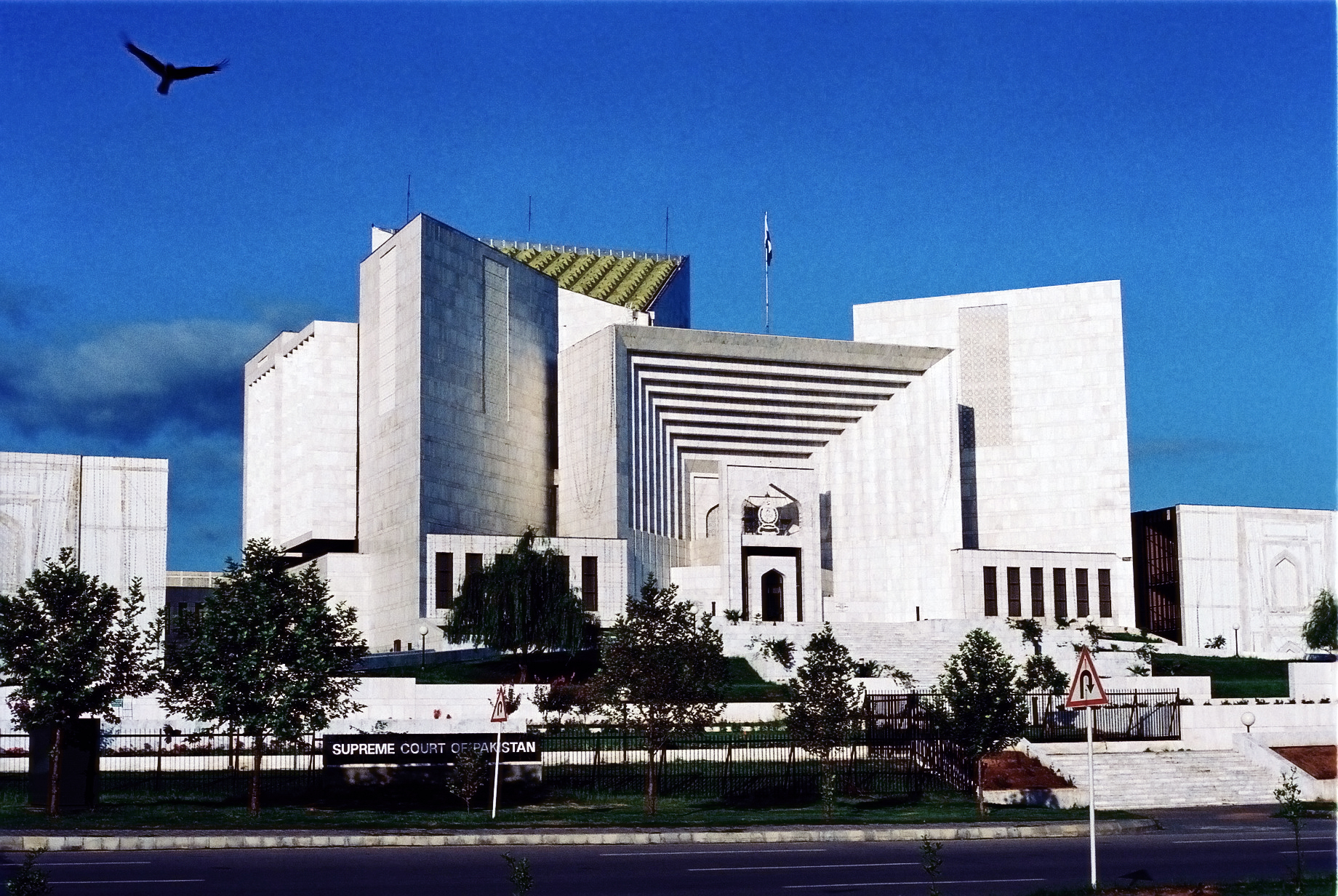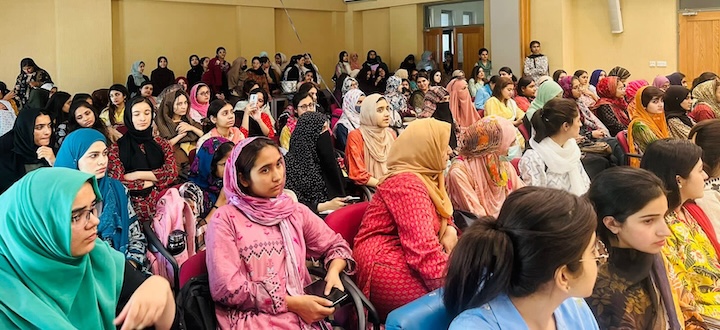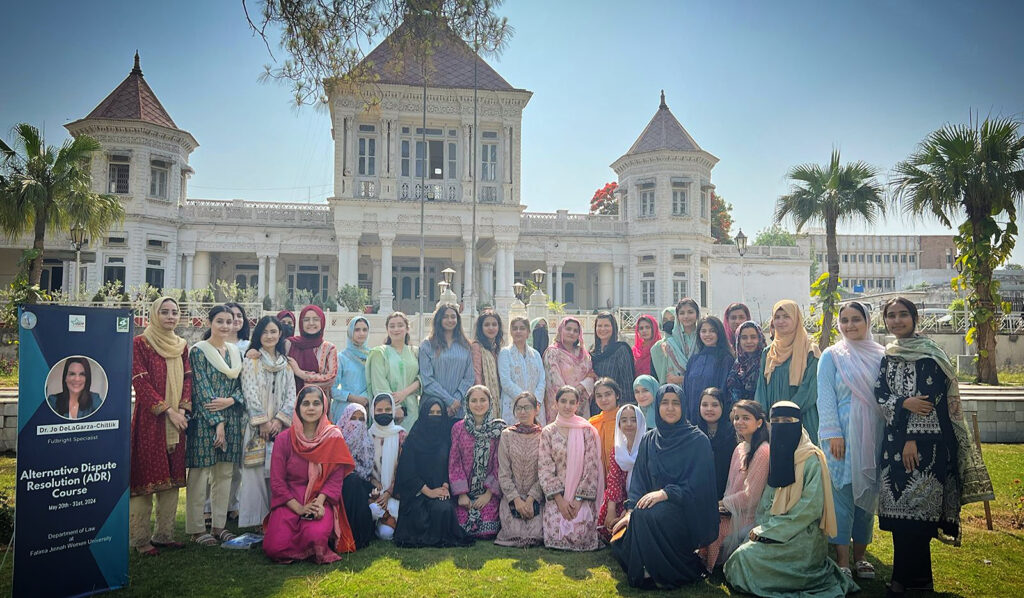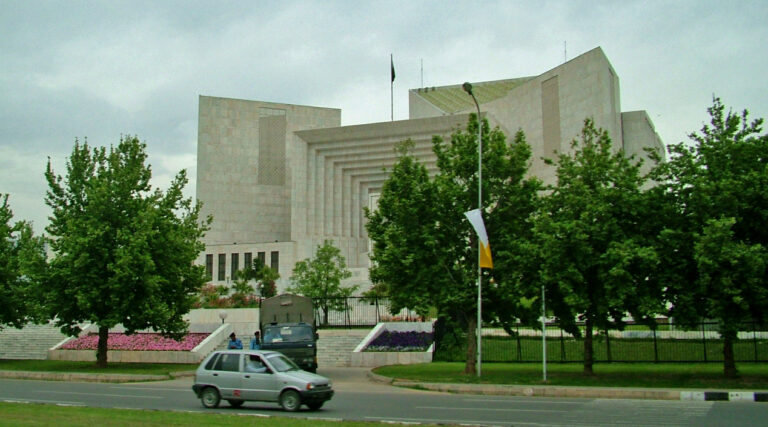
Promoting Diversity Through Court-Mandated Mediation
Jo Chitlik
Photo of Supreme Court of Pakistan from Wikimedia (CC BY-SA 4.0).
Pakistan’s Alternative Dispute Resolution (ADR) Act (XX of 2017) represents a significant step towards increasing female participation within the legal sphere. With specific provisions on female representation in court-mandated mediation and ADR centers, this Act moves Pakistan towards a more inclusive and equitable legal system for women.
Robust frameworks which both incorporate and adhere to domestic laws, regulations, as well as international standards, such as global and regional conventions and humanitarian, criminal, and human rights law, are essential for maximizing the effectiveness and impact of societal institutions. By operating within a clear legal and ethical framework, civil institutions can enhance their credibility, accountability, and sustainability while also contributing meaningfully to the promotion of justice, human rights, and overall societal well-being.
This article examines the 2017 Act’s provisions regarding the due representation of women in court-mandated mediation panels and Alternative Dispute Resolution (ADR) centers. By analyzing the historical context of women’s legal participation in Pakistan, this article will shed new light on the Act’s importance. Further, it compares the 2017 Act with similar legislation in the West to highlight Pakistan’s progressive approach to legal reforms. This article also incorporates relevant Quranic verses supporting the concept of women’s wisdom within dispute resolution in congruence with references to the UN Guidance on Gender and Inclusive Mediation Strategies. Finally, this article proposes recommendations for legal practitioner’s, courts, and government institutions for further implementation and improvement of the Act’s impact on the female legal profession.
Introduction
Gender is a fundamental determinant of power dynamics in society as it shapes expectations, opportunities, and values for both women and men. Gender roles and norms vary significantly across cultures which influences how individuals perceive and interact with one another. A deep understanding of these gendered cultural nuances is essential for effectively promoting women’s participation in dispute resolution processes. By recognizing and addressing gender-based disparities, it is possible to create a more equitable and inclusive environment for all parties involved.
Pakistan’s legal landscape is undergoing a period of positive transformation with a growing emphasis on women’s rights and participation. The 2017 Act represents a significant milestone in this progress by mandating the inclusion of female legal professionals in court-mediated disputes and Alternative Dispute Resolution (ADR) centers. This policy shift offers a promising opportunity to enhance diversity and inclusivity within the Pakistani legal system. By examining the specific provisions of the Act, and placing them in conversation with the verses of the Qur’an that have long inspired traditional approaches to dispute resolution in Pakistan, this article aims to assess its potential to create a more equitable and accessible justice system for all.
Due Representation for Female Neutrals and Islamic Principles
The Qur’an emphasizes the importance of consultation, a key component in mediation. Surah Ash-Shura (42:38) states, “And those who respond to the call of their Lord and fear Him and consult among themselves about their affairs.” This verse emphasizes the value of collaborative problem-solving: a crucial aspect of mediation. Following the Qur’an, Pakistan values peaceful dispute resolution and the problem-solving nature of mediation.
The 2017 Act honors the role of mediation in the Qur’an and addresses the historical underrepresentation of women in dispute resolution processes. By mandating “due representation” of female Neutrals as defined by law in court-mandated mediations, the Act seeks to create a more equitable and inclusive dispute resolution landscape in the adjudication of court cases.
Section 4(2) of the Act explicitly requires that qualified female lawyers have a fair opportunity to be selected as mediators in court-referred cases. The standard set by the Act for their appointment of a court-appointed mediator is not associated with gender; rather, the standard for female mediators aligns with the prescribed qualifications and experience as set forth in the law.
Furthermore, Section 6(2) stipulates that when one or both parties to a dispute are women, the case should preferably be assigned to a mediation team that includes a female mediator. This provision acknowledges the unique perspectives and experiences women bring to the table, and it aims to foster a sense of trust and security for female litigants.
In Muslim-majority countries, traditionally, men and women who are unrelated may be forbidden or limited in close interactions or to participate in the same social spaces in an effort to preserve modesty. Culture also plays an important role in defining acceptable norms of interaction. More importantly, men are entrusted to be proper caretakers of women, this includes being aware and sensitive to their needs at any given moment in life. Therefore, by involving women in mediation, the process adheres to traditional Islamic principles contained in the Qur’an, which subscribe to the separation between men and women while also allowing female parties to dispute the freedom to discuss matters without constraint, embarrassment, or who otherwise feel unable to do so in front of an all-male panel. By providing female mediators, you provide an avenue for women to articulate their truth, and you take away a possibility for the miscarriage of justice.

While the 2017 Act does not impose a rigid quota system, its emphasis on due representation encourages courts to prioritize the appointment of female mediators in appropriate cases. This approach aligns with the Quranic principle of entrusting women with matters concerning them, recognizing their inherent wisdom and understanding of women by women. By promoting the inclusion of female neutrals, the Act strives to create a dispute resolution system that is more responsive to the needs and experiences of women.
Historical Context: Women in Pakistan’s Legal System
The historical context of women’s participation in Pakistan’s legal system underscores the significance of recent legislative efforts to increase female representation. While women lawyers were a rarity in the 1990s, the past two decades have witnessed a remarkable surge in their numbers. This growing cohort has ascended to prominent positions as judges, advocates, and legal advisors which has transformed the Pakistani legal landscape. This evolution signifies a broader societal shift as Pakistani women not only seek justice but actively contribute to its dispensation.
Pakistan has experienced a notable increase in the number of female lawyers over the past two decades. From a modest figure of women lawyers in 1994, the profession has expanded to include thousands of women today. This growth is attributable in part to initiatives aimed at promoting female education and legal training. However, despite this progress, women remain underrepresented in leadership roles within the legal system including within the realm of Alternative Dispute Resolution (ADR). The legal profession is generally considered a male-dominated profession in Pakistan, as such, women face a variety of difficulties and challenges in their efforts to excel. Due to this, the 2017 Act represents a crucial step towards rectifying this imbalance by fostering a more inclusive and equitable dispute resolution process.
The United Nations and Gender-Inclusive Mediation
According to the UN Guidance for Effective Mediation (2012), “inclusivity” has two key dimensions. Firstly, it refers to how comprehensively the views and needs of all involved parties are represented. Secondly, it highlights the importance of integrating these perspectives into both the mediation process and its final outcome. Inclusive mediation rests on the assumption that building sustainable peace requires integrating diverse societal perspectives, specifically those social perspectives of conflicting parties and other stakeholders, into the peacemaking process.
The United Nations (UN) actively supports the inclusion of women in mediation. The UN Guidance on Gender and Inclusive Mediation Strategies emphasizes the underrepresentation of women in ADR globally. This guidance builds on the premise that mediation strategies which systematically include women, and civil society more broadly, are more likely to generate national ownership and support for a negotiated settlement between parties and to lead to more sustainable outcomes for civil society as a whole.
Women’s participation can expand the range of domestic constituencies engaged, which ultimately leads to strengthening the legitimacy and credibility of mediation as a viable means of resolving disputes. Indeed, women’s perspectives bring a different understanding of the causes of disputes, which can generate much more comprehensive targeted proposals for their resolution. Settlement agreements that are responsive to the needs of women and girls, men and boys, contribute to a much more orderly society by truly resolving disputes between parties. However, studies demonstrate that women are less likely than men to be appointed as mediators or included in mediation teams.
A Progressive Approach in Comparison
While the 2017 Act represents a progressive step, a comparative legal analysis with similar legislation in developed countries is necessary to fully appreciate its progressive nature. The United States, United Kingdom, and Canada have also implemented measures promoting gender diversity in mediation rosters. However, Western efforts lack the mandatory inclusion clauses found in the Pakistani Act. These western countries rely on voluntary initiatives and unconscious bias training for mediators. In simpler terms, the western approach to gender diversity relies on the good faith belief that given the opportunity, humans will choose to do the right thing. It is a noble sentiment; however, it is the codification of policy that marks a decisive path towards the modification of social conduct, not merely hoping that behavior will change. Therefore, this comparison highlights Pakistan’s proactive approach in ensuring women’s participation in court-mandated mediation and ADR centers.
The 2017 Act mandates “due representation” for female attorneys in the panel of Neutrals for court-mandated mediations. This ensures a pool of qualified and experienced women mediators who are readily available for cases. Moreover, the Act stipulates that when a case involving a woman (or women) is referred to an ADR center, the case “shall be preferably dealt with by a team that includes a woman.” Importantly, Pakistani legislation recognizes that disputes impact women differently from men. This preferential treatment aims to create a more comfortable and trusting environment for women parties in the mediation process. Such legal sensitivity positively impacts the ability to reach settlements as it fits neatly into the cultural framework of Pakistan and better allows for just resolution especially in disputes where at least one party is a woman.
In the United States, the Federal Mediation and Conciliation Service promotes diversity in its rosters, but it is not mandated by law. The United Kingdom’s Civil Procedure Rules encourage parties to consider diversity when selecting mediators, but it is not a requirement. Canada’s ADR landscape is similar, as it has a focus on promoting diversity, but with rules that have no specific requirements.
In contrast, the 2017 Pakistani Act aligns perfectly with the United Nations’ call for increased participation of women in peace and conflict resolution processes, recognizing the unique skills and perspectives women bring to the table. Pakistan’s legislation, therefore, takes a more proactive stance in ensuring women’s voices are heard in ADR through the mandate of a female mediator to disputes involving women. The next step is effective implementation.
Ongoing Implementation and Improvement
The 2017 Act represents a crucial stride towards addressing the challenges faced by Pakistani female attorneys. However, its effectiveness will hinge upon the robust and consistent implementation of its provisions. While the initial steps are commendable, there is substantial potential for enhancement in the practical execution of these ADR mechanisms to bring about tangible improvements in the everyday lives of Pakistani women. With more just outcomes to disputes, there is potential for closing the Pakistani gender gap.
Closing the Gender Gap
The 2024 Global Gender Gap Report continues to rank Southern Asia as seventh in the list of global continents with a parity score of 63.7%. Gender gap reports are designed to track the unfair or undesirable difference in terms of opportunity between men and women. Parity refers to the equal representation of each gender.
Pakistan has a female population of over 119 million. The country comes in at second to last on the 2024 index (145th), having achieved a gender gap closure of roughly 57% out of 100%. This low performance reflects substantive gender gaps in both economic and political parity, as well as a lag in both the educational attainment sub-indexes, where most other world economies have reached parity.

Despite showing a positive trajectory on Educational Attainment since 2006, Pakistan is yet to catch up to the majority of the global economies in the subindex, here their rank, 139th out of 143.
Despite its low ranking, the yearly reports on Pakistan chart a modest upward trajectory. Since 2006, there has been a +3.9% improvement in parity. Its gender parity score of 38.8% communicates low labor-force participation rates for women and significant gender disparities in leadership roles. Pakistan continues to display strong gender imbalance in favor of men (35.8%) within the 2024 Global Gender Gap Report.
Accreditation Committee
The 2017 Act represents a significant step toward addressing the challenges faced by Pakistani female attorneys. While its enactment is commendable, the Act’s full potential to improve the lives of Pakistani women will hinge on the rigorous and consistent implementation of its woman mediator mandate. To fully realize the Act’s potential for transforming the lives of Pakistani women, a concerted and comprehensive approach is imperative. Such a comprehensive approach will not only address the letter of the law but also its Pakistani spirit.
The 2017 Act outlines the criteria for selecting Neutrals to serve on district panels. It mandates that a Neutral must be an attorney with significant practice experience (7 years) and high moral character. While these qualifications are gender-neutral, the subsequent suggestion of potential candidates to the Neutrals pool raises concerns about the inclusion of women. Given the underrepresentation of women in traditional male-dominated fields like the judiciary, civil service, and religious leadership. It is imperative to investigate the actual composition of these panels. A gender analysis of the selected Neutrals is crucial to assess the law’s effectiveness in promoting gender equality and inclusivity within this important decision-making body.
To date, the practical execution of these mechanisms has shown great promise but has fallen short of realizing its full potential. A critical area for enhancement lies in the composition of the Accreditation Committee as mandated by the 2023 Alternative Dispute Resolution, sub-rule (1) of Rule 4.
Currently, in the Pakistani capital city of Islamabad, the Accreditation Committee responsible for evaluating both male and female mediator candidates is comprised exclusively of males. This gender imbalance raises concerns about potential biases and inequalities in the accreditation process due to the lack of female representation. Female representation creates accountability, since part of their job would be to ensure the criteria for accepting legal professionals is applied equally across the genders. To ensure a fairness, transparency, and equitable system, it is imperative to include female representation on the Accreditation Committee.
Court Accredited Mediators
The pronounced gender disparity among court accredited mediators in the capital city of Islamabad necessitates a comprehensive examination beyond mere preference for male attorneys. An analysis of accredited mediator lists issued by the Accreditation Committee in 2023 revealed the following: In April 2023, there were 39 accredited mediators, of which 9 were women. A subsequent list from July 2023 showed 30 accredited individuals, including 7 women. These figures indicate an overall female representation of 23% among accredited mediators.While this imbalance is alarming, it is crucial to recognize that multiple factors contribute to the underrepresentation of female attorneys in the accreditation process.
To fully comprehend the root causes of this issue, a deeper analysis of the Pakistani legal professional world is required. Such an investigation should explore potential barriers faced by female attorneys which may include, but not be limited by, the following: discriminatory practices, unconscious biases, and systemic obstacles within the legal profession and the mediation field. By identifying these underlying factors, targeted interventions can be developed to promote gender equality within the legal profession and create a more inclusive environment for female mediators in Islamabad. Ultimately, achieving a balanced representation of male and female mediators is essential for ensuring fairness, diversity, and effectiveness in the mediation process.
Not Meeting the Requirements
A critical factor hindering female representation is the unequal access to specialized ADR training. Without adequate preparation, Pakistani women attorneys are at a significant disadvantage when competing for accreditation as mediators. This highlights the urgent need for targeted interventions to address this gender imbalance in legal education access. To foster a truly inclusive and equitable ADR system, several recommendations are imperative. Implementing gender parity within the Accreditation Committee is a crucial first step which will ensure that decision-making is balanced. Comprehensive diversity training for committee members will cultivate a more sensitive and equitable environment. Establishing external oversight mechanisms will enhance transparency and accountability. Rigorous data collection and analysis will provide valuable insights to inform targeted interventions. Finally, mentorship and support programs for female attorneys will empower them to overcome other barriers, both social and professional, to achieve accreditation.
By embracing these recommendations, Pakistan can solidify its position as a pioneer in gender equality within the area of ADR. A mediation system that reflects the diversity of the population is not only a matter of justice but also a catalyst for progress. By empowering women in the legal profession, Pakistan can create a more just and equitable society for all. Ultimately, the goal is to dismantle the systemic obstacles preventing female attorneys from achieving accreditation and to create a level playing field where merit, not gender, determines success.
On The List, Now What?
While the inclusion of female attorneys in the accreditation lists is a significant step forward, it is merely the first step of many. The true measure of Pakistani progress lies in women’s active participation in the mediation process. To bridge the gap between accreditation and practice, strategic interventions are imperative. Pakistani ADR offers a unique opportunity to expedite this transition.The discretionary powers vested in Pakistani judges are instrumental in shaping the mediation landscape. By judiciously exercising their authority to not only mandate mediation but also to actively guide parties towards suitable mediators, judges can catalyze a transformative shift. This is particularly crucial in cases involving female parties.Imposing a rule mandating female mediation for disputes involving female parties is not merely a gender equality measure, but a strategic step towards ensuring the proper application of law. By entrusting these cases to female mediators, the system can harness their unique perspectives and expertise, leading to more equitable and effective resolutions. This approach not only empowers female attorneys but also enhances the overall efficacy of the ADR process. Ultimately, the success of this endeavor hinges on the continued commitment of the judiciary to fostering a supportive environment for female mediators. By championing their inclusion and leveraging their discretion to facilitate their practice, Pakistani judges can play a pivotal role in creating a more just and equitable dispute resolution system.
Conclusion
The 2017 Act represents a significant stride towards a more inclusive and equitable justice system in Pakistan. By explicitly recognizing the role of female mediators, the legislation empowers women to actively participate in conflict resolution and contribute their unique perspectives to the process, while upholding Islamic principles. This is particularly crucial in addressing the needs of marginalized groups, including demographic, religious, and regional minorities, youth, and civil society organizations. Beyond enhancing access to justice for women, the 2017 Act holds the potential to transform dispute resolution outcomes. Research has shown that female mediators often bring distinct approaches and communication styles that can lead to more durable and satisfactory settlements. By leveraging the skills and expertise of female mediators, Pakistan can cultivate a more peaceful and just society.However, the full potential of the 2017 Act can only be realized through sustained efforts. Investing in comprehensive training programs, raising public awareness about the benefits of female mediation, and creating supportive institutional environments are essential steps to follow the letter and spirit of the Act. By prioritizing these initiatives, Pakistan can position itself as a global leader in gender-inclusive dispute resolution and inspire other countries to follow suit. Ultimately, the success of the 2017 Act is contingent upon its effective implementation and evaluation. By monitoring the Act’s impact and making necessary adjustments, policymakers can ensure that it continues to deliver tangible benefits for women and the broader Pakistani community. ♦

Jo Chitlik is a U.S. Department of State Fulbright Specialist, a Senior Fellow at Emory University’s Center for the Study of Law and Religion, and Visiting Scholar at Fatima Jinnah Women’s University (FJWU) in Rawalpindi, Pakistan. Through their affiliate GlobalLearningOnline.com, Chitlik and her Emory alumni team created Pakistan’s ADR Pilot Program taught at FJWU.
Recommended Citation
Chitlik, Jo. “Promoting Diversity Through Court-Mandated Mediation.” Canopy Forum, August 26, 2024. https://canopyforum.org/2024/08/26/promoting-diversity-through-court-mandated-mediation/
Recent Posts










